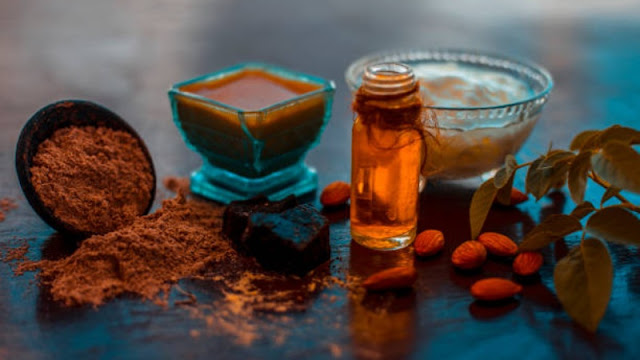- Get link
- X
- Other Apps
- Get link
- X
- Other Apps

In the pursuit of radiant and healthy skin, Ayurveda, the
ancient Indian system of medicine, offers invaluable insights and remedies for
various skin concerns, including pigmentation. Skin pigmentation, characterized
by uneven skin tone, dark spots, and hyperpigmentation, is a common issue that
many individuals grapple with. Ayurveda, with its holistic approach, provides
natural and time-tested solutions to restore balance and harmony to the skin.
Let's explore the best practices according to Ayurveda for managing skin
pigmentation.
Understanding Skin Pigmentation in Ayurveda
Ayurveda views the skin as a reflection of one's overall
health and well-being. According to Ayurvedic principles, skin pigmentationissues are often linked to imbalances in the three doshas—Vata, Pitta, and
Kapha. An imbalance in any of these doshas can manifest as different skin
conditions, including pigmentation disorders.
1. Vata Imbalance:
Vata dosha governs movement and is associated with dryness.
An excess of Vata can lead to dry, rough skin with uneven pigmentation.
Ayurvedic remedies for Vata-related pigmentation involve
nourishing the skin with warm oils and moisture-retaining substances.
2. Pitta Imbalance:
Pitta dosha is linked to fire and governs digestion and
metabolism. Excessive Pitta can cause inflammation, leading to conditions like
melasma and sunspots.
Cooling herbs and substances are recommended to pacify
Pitta, such as aloe vera and sandalwood.
3. Kapha Imbalance:
Kapha dosha is associated with water and earth elements. An
imbalance can result in excessive oiliness and congestion, contributing to
pigmentation issues.
Detoxifying and stimulating herbs are suggested to balance
Kapha, including turmeric and neem.
Ayurvedic Herbs for Skin Pigmentation
Ayurveda harnesses the power of various herbs with potent
skin-healing properties. These herbs are often used both internally and
externally to address pigmentation concerns.
1. Turmeric (Curcuma longa):
Turmeric is renowned for its anti-inflammatory and
antioxidant properties. It helps reduce pigmentation and brightens the skin.
Consuming turmeric internally or applying a turmeric paste
externally can be beneficial.
2. Neem (Azadirachta indica):
Neem is a potent detoxifier with antibacterial properties.
It helps clear toxins from the blood, addressing the root cause of
pigmentation.
Neem oil or neem leaves paste can be applied topically for
effective results.
3. Aloe Vera:
Aloe vera is cooling and soothing, making it ideal for
calming inflamed skin. It also promotes healing and helps fade dark spots.
Fresh aloe vera gel can be applied to the affected areas
regularly.
4. Manjistha (Rubia cordifolia):
Manjistha is a blood-purifying herb that aids in the removal
of toxins. It is particularly beneficial for Pitta-related pigmentation issues.
It can be consumed as a powder or in the form of a
decoction.
Dietary Recommendations for Healthy Skin
Ayurveda places a strong emphasis on the connection between
diet and skin health. Adopting a skin-friendly diet can play a pivotal role in
managing pigmentation issues.
1. Hydration:
Adequate water intake is crucial for flushing out toxins
from the body. Water helps maintain skin elasticity and supports overall skin
health.
2. Balanced Diet:
A diet rich in colorful fruits and vegetables provides
essential vitamins and antioxidants that contribute to skin health.
3. Ghee (Clarified Butter):
Ghee, when consumed in moderation, nourishes the skin from
within. It is believed to have rejuvenating effects on the skin.
Lifestyle Practices for Healthy Skin
Apart from herbal remedies and dietary adjustments, Ayurveda
advocates certain lifestyle practices to promote skin wellness.
1. Abhyanga (Oil Massage):
Regular oil massages, especially with sesame or coconut oil,
improve circulation and nourish the skin. This practice is particularly
beneficial for Vata-related pigmentation.
2. Sun Protection:
Protecting the skin from excessive sun exposure is crucial.
Ayurveda recommends natural sunscreens like applying a paste of sandalwood or
using coconut oil.
3. Stress Management:
Chronic stress can contribute to skin issues. Practices like
yoga and meditation help manage stress and promote overall well-being.
Conclusion
In the realm of skincare, Ayurveda offers a treasure trove of wisdom that goes beyond surface-level treatments. By addressing the root causes of pigmentation imbalances, Ayurveda provides holistic solutions that encompass dietary, herbal, and lifestyle interventions. Embracing these Ayurvedic practices can lead to not only visibly healthier skin but also a harmonious balance in the body and mind. As always, it is advisable to consult with an Ayurvedic practitioner for personalized guidance based on individual dosha imbalances and specific skin concerns.
- Get link
- X
- Other Apps